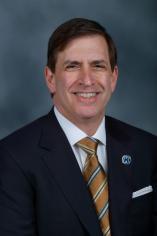şÚÁĎÍř’s Brain Health Research Institute (BHRI) has begun a new Neurodiversity Research Initiative to shed light on the perspective of neurodiverse individuals.
The idea for the initiative came about two years ago, after an article was published detailing the efforts of a BHRI professor who was researching animal models of autistic brains, delving into the brain circuitry on a cellular level with the goal of one day developing drug therapies that could enable individuals with autism to experience more conventional social interactions.

A student who is autistic read the article and took offense, and voiced her concerns to Michael Lehman, Ph.D., director of the BHRI.
“She came to talk to me after the article came out and was very blunt. She said, `I’m autistic and I don’t consider myself to be broken. I deserve to be respected for my differences and who I am,’” Lehman recalled.
It was eye-opening for Lehman.
“My background is in academic medicine, with a perspective on brain research from a disease point of view,” he said. “Most neuroscientists are not aware of neurodiversity as an issue or hearing the perspectives of neurodiverse individuals,” Lehman said.
He took the student’s comments to heart and committed to doing something to expand the perspective of the BHRI’s work. The new initiative, the fulfillment of that promise, was formalized earlier this semester and brings together researchers, educators, health and service professionals, and neurodiverse individuals, with the goal of stimulating and supporting inclusive and innovative interdisciplinary research and education leading to a broader and deeper understanding of neurodiversity.
“We have to have this conversation and make everybody aware of the discussion about what neurodiversity really is,” Lehman said. “This extends beyond autism and other things that we have classically thought of as disabilities. We must incorporate into that an awareness that for a lot of individuals there’s nothing broken to be fixed.”
The conversation, Lehman said, is about learning the neurodiverse individual's view of the world.
“It’s a different perspective on what makes us different as human beings so that we can learn from each other to enhance the quality of life for all of us,” he said. “This is the best of our Kent State tradition. We’re leading the way in making this a better world.”

Lisa Audet, Ph.D., assistant professor of speech pathology and audiology, and Professor Mary Ann Devine, Ph.D., who directs the Disability Studies and Community Inclusion minor/graduate certificate, are co-directors of the new initiative.

Audet said the initiative will bring together researchers from different areas to look at the needs of people who are neurodiverse, and to help raise awareness of the needs of neurodiverse students.
“This is an opportunity for Kent State to engage in really groundbreaking research that is inclusive in the area of neurodiversity,” Audet said.
Audet and Tina Patel, Ph.D., assistant professor of interior design in the College of Architecture and Environmental Design, are conducting one of the initiative’s first projects, researching how to create sensory safe spaces on campus for people who are neurodiverse.

“We are getting the perceptions of those who are neurodiverse about what makes for a sensory safe space for them,” she said.
Kent State staff member Lisa Everson, an administrative assistant in the School of Art who identifies as neurodivergent due to ADHD and dyslexia, is one of the newest members of the leadership committee.

Everson, who earned a degree in sociology at Kent State in 2022, said she is eager to participate and bring the perspective of someone with a neurodivergent brain. She is also excited about the possibility of groundbreaking research in the area.
“I really want to see Kent State ahead of the curve with neurodiversity,” she said.
Everson said it is important to understand that, unlike other bodily organs, no two brains are alike, making everyone neurodiverse. She prefers the term neurodivergent because it better explains a brain that diverges from the accepted social standards for what is typical.
Unlike a heart or gallbladder that can be diagnosed as ill or diseased and cured with surgery or medicine, the neurodivergent brains of people who are autistic or who have ADHD or other disorders are not in need of a medical cure, but rather of greater understanding of how their brains work, she stressed.
People with neurodivergent brains are often more creative and can find solutions to problems neurotypical brains cannot, due to their ability to comprehend the abstract more easily, Everson said.
“The arts are full of neurodivergent brains,” she said. “Difference is a powerful thing. It’s a superpower talent.”
The Neurodiversity Research Initiative is seeking members and will kick off its efforts on April 21, when it hosts the first Neurodiversity Research Initiative Invited Lectureship on the topic “Advancing Neurodiversity Advocacy Through Education and Research,” with guest speaker Lawrence Fung, M.D., Ph.D., assistant professor of psychiatry and behavioral sciences at Stanford University.
Fung’s talk will take place from 12:30 to 1:30 p.m. Friday, April 21, in the lower-level lobby of the Integrated Sciences Building. The event is open to faculty, staff and students, and will be followed by a Neurodiversity Research Initiative roundtable discussion on the topic of “Advancing Neurodiversity Advocacy Through Education and Research,” from 1:45 - 2:45 p.m.

